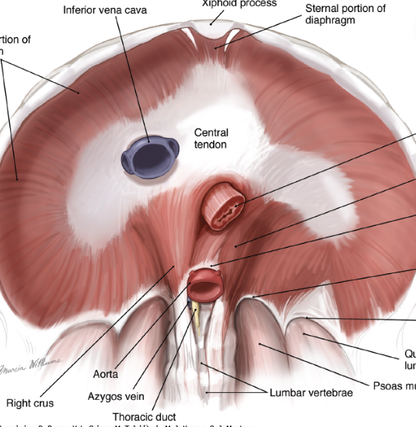|
Breath It's one of the more subtle things that we don't think about. It's also one of the few automated happenings in our body that is both involuntary(automatic) and voluntary(can be controlled). Adults, when resting, usually breathe about 12-20 times per minute, and over the course of a day, that adds up to 17,000-30,000 breaths per day — or more. In that it's about about 10,000 to 11,000 litres of air per day! Think about it, even when we sleep, we are still breathing, so why don't we notice or think about breath or breathing? If breath is related to so many aspects of our lives from emotional to physical being, which is our day to day living, shouldn't we be taking care of how we breath? By the end of this article we hope to have you know why breath works can be something you pick up and practise. Emotions Observe the last time you had an argument with someone, how did you breathe? How about when you were sad? Now think about when you are happy or when you were on a holiday having nothing to think about. On all emotional levels, we breathe very differently from moment to moment, it's only when you notice it, that it becomes easier for you to realise that you are being affected by something and to quickly slow the breath down. This helps you to control how you react to the environment each time you become more efficient in awareness of how you breath. You may not think of it as much but the next time you have a conversation with anyone or think about something in your mind for a while, drifting away in your thoughts, bring yourself to awareness and see how your breath has been affected. Remember the picture above? Take a look at it again. Did you realise how it made you breathe differently? Emotional factors as well affect how your posture is, it's hard to see a confident person slouching and vice versa. When posture changes due to emotional or mental state of mind, your breath as well changes, breath becomes shorter and much more shallow. It's a chain of events that happens not overnight but gradually with time, your body thinks it's normal and you adapt and get on with life thinking that this "altered state of breathing" is how you breathe and it's normal, until you learn attend a breathing lesson. Healing from inside Like everything living, our cells in the body needs oxygen to survive and thrive. When there is an area in our body that has lower levels of oxygen due to stagnation, a condition also known as tissue hypoxia happens. This can be seen in tight muscles, trigger points, scar tissue that did not heal properly and other medical conditions which is fitting for another article. Rapid and deep breathing leads us to release more carbon dioxide from the body than usual, causing the blood to become more alkaline and retain more oxygen and when that happens our cells gets nourished and you create more flow inside the body. Each time you go through any form of excessive physical or mental stress, you release the hormones called cortisol. Cortisol helps regulate a few things in your body:
Mental clarity Weighing only at about 2 percent of our bodyweight, the brain uses a whopping 20 percent of oxygen that we breathe in, that means the brain uses up to about three times as much oxygen compared to our muscles! Talk about brains and brawn! The brain cells are extremely sensitive to oxygen deprivation and quickly begin to die without sufficient amount of oxygen to it, that's why it's important to give CPR to a person who's unconscious immediately if that person is to survive the ordeal. When you heighten your awareness to the breathing techniques, your mind deviates from other thoughts that may fog out your ability to think clearly, creativity lowers, immune system follows through and the next thing you know, frustration and depression sets in. Breathing well and breathing better each day can help with mental clarity, which translate a better life experiences. Energy and performance An increased volume of air into your lungs means you have more uptake of oxygen to supply to your working muscles including your brain! Having a higher amount of oxygen also mean that now you can get rid of metabolic waste products like lactic acid , which is a by product of your muscles working. Think about lifting weights at the gym, where you start repping around the 12 reps and you feel the "burn" and try and lift that weight but not happening as the burn is too much. That lactic acid feeling is due to the lack of oxygen, so if you can have more air uptake you can rid of lactic acid and recycle the oxygen into your working muscles more efficiently. So would in many other sports that high level athletes that trains, they all have a higher oxygen uptake so that they can keep going longer and stronger. The Lymphatic system Deep diaphragmatic breathing helps to increase function of the lymphatic system by increasing venous returns to the heart amongst many things. This mean that your body can increase the drainage process of foreign substances which may be lingering in your body making you feel sick often. Deep diaphragmatic breathing acts like a pump via the inferior vena cava (pictured above) where the large vein that carries deoxygenated blood from the lower and middle body into the right atrium of the heart. The bridge between mind & body The mind & body often is disconnected, the breath in all its subtleness bridges the metaphysical relationship between mind and matter, between substance and attribute, and between potentiality and actuality. Everything affects the breath and the breath, everything, and everything starts and ends with the breath. If there is no flow and stagnation happens, it becomes poison in our system and decay follows shortly. Come and join us at MSMC as we are the only ones who does extensive breath works that will help you change your physical and mental aspects of your life, wherever your journey in life is.
0 Comments
Leave a Reply. |
Location151 A #02
Kitchener Road S(208526) Train Station: Farrer Park |
|




 RSS Feed
RSS Feed